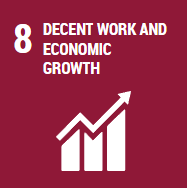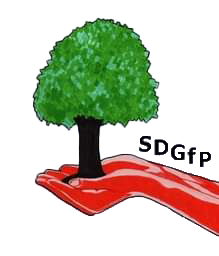Sustainable Development Goal 8. Decent Work and Economic Growth

Sustainable Development Goal 8 is about "decent work and economic growth" and is one of the 17 Sustainable Development Goals which were established by the United Nations General Assembly in 2015. The full title is to: "Foster sustained, inclusive and sustainable economic growth, full and productive employment and decent work for all." Progress towards targets will be measured, monitored and evaluated by 17 indicators.
SDG 8 has twelve targets in total to be achieved by 2030.
8.1: Sustainable economic growth
8.2: Diversify, innovate and upgrade for economic productivity
8.3: Promote policies to support job creation and growing enterprises
8.4: Improve resource efficiency in consumption and production
8.5: Full employment and decent work with equal pay
8.6: Promote youth employment, education and training
8.7: End modern slavery, trafficking, and child labour
8.8: Protect labour rights and promote safe working environments
8.9: Promote beneficial and sustainable tourism
8.10: Universal access to banking, insurance and financial services
8.a: Increase aid for trade support
8.b: Develop a global youth employment strategy
While developing countries have grown at a rate faster than developed regions, sustained economic growth everywhere is critical to fulfilling the international developmental targets over the next years. Economic growth – making our world more prosperous – is inextricably linked to all our priorities. Stronger economies will afford more opportunities to build a more resilient and sustainable world. And economic growth must be inclusive: growth that does not improve the wellbeing of all sections of society, especially the most vulnerable, is unequal and unfair.
This goal aims at ensuring the economic sector of every country provides the necessary need for its citizen to have a good life irrespective of their background, race or culture. Roughly half the world’s population still lives on the equivalent of about US$2 a day. In many places, having a job does not guarantee the ability to escape from poverty. This slow and uneven progress could require everyone to rethink and retool the economic and social policies aimed at eradicating poverty.
For close to three decades, the number of workers living in extreme poverty has reduced drastically. This is despite the lasting impact of the 2008 economic crisis and global recession. In developing countries, 34 per cent of total employments were for the middle class, a number that has increased rapidly between 1991 and 2015. In spite of that, the global economy continues to recover; the world is seeing slower growth and inequalities widened.
SDG 8 aims at fostering sustainable and equitable economic growth for all workers, irrespective of their background, race or gender. This means achieving “higher levels of economic productivity through diversification, technological upgrading and innovation, including through a focus on high-value added and labour-intensive sectors”.
Inclusive and sustainable economic growth, technology, and structural transformation are critical and must be guided by an overall strategic direction. This maybe more crucial than ever, in view of the unprecedented impacts of new technology clusters on all SDG areas and particularly on the future of work and global growth. High levels of inequalities continue as major obstacles to SDG 8 progress. Achieving many of the other SDGs depends on progress under the SDG 8 targets. Mobilizing the policy priorities, instruments, partnerships and resources that SDG 8- related interventions can bring is therefore crucial for ending all forms of poverty and reducing inequalities, while ensuring that no one is left behind. Furthermore, progress towards SDG 8 alone “means nothing”, if it allows environmental degradation and social exclusion.
There is no substitute for productivity growth or trade-off, heightened productivity growth is needed for job creation. Protection of rights and jobs must happen in tandem with clear creation of employment policies. In many countries, an industry-led economic transformation still holds the greatest potential for broad-based improvements in labour productivity and, resultingly, decent jobs and affordable products. When framed within supportive legislation and complemented by targeted public policies, it can address the objective of economic growth, resource de-coupling and inclusiveness.
‘No one left behind’ is at the core of the sustainable development agenda for 2030 and if economic growth is to build a fairer world, it must be inclusive. This is the idea behind Goal 8, which aims to sustain an economic growth rate of 7% for the least developed countries by 2030, and achieve full and productive employment for all men and women everywhere in the next years. Human and labour rights, freedom of association and collective bargaining and social dialogue are not only essential ingredients for sustainable economic growth but are the pillars of democracy-building. Building and fortifying democratic processes is in turn the cornerstone of just development.
Links to other SDGs
The attainment of SDG 8 is vested on the success and progress of other SDGs. There cannot be growth in the economy of any country if its citizens are not well educated. Therefore, SDG 8; Decent Work and Economic Growth interlinks with Quality Education (SDG 4),Gender Equality (SDG 5) for equal work opportunities.There are also strong ties with Industry, Innovation and Infrastructure (SDG 9) and Responsible consumption and production (SDG 12).
Aside for the aforementioned inter-related SDGs, it is worthy to note that the progress of SDG 8 aids to reduce the per cent poverty rate in any given country on Poverty ranks. Success in meeting of SDG 8 targets is directly related to achievement of targets of No poverty (SDG 1).




